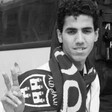15 August 2011
I always believed to write is to “make less the depth of grief.” But it’s been long since I wrote down anything, and indeed I spent long and hard time attempting to convince myself that this latest recurring experience of mine isn’t any different and, like many other episodes in my life, can be recorded well.
There is no phrase in regard to the Palestinian-Israeli conflict that I hate as much as that of “the suffering of both peoples,” “the fear both peoples have to go through,” “the trauma both peoples experience” and the like, usually made in places like the UN General Assembly’s podiums, international forums or even in the White House. Not that I care whether those neatly-suited, shiny-black-shoed politicians are neutral or one-sided— meaning pro-Israel because there are definitely no such politicians who are on the side of the Palestinians — or whether they have the sort of genuine interest needed to solve this seemingly insoluble conflict.
But considering the fact that I sometimes tend to be a little bit selfish, I hate that my personal suffering, let alone the suffering of 1.6 million Palestinians living in Gaza, be seriously sabotaged by such phrases. Once analogized, my suffering is unreliably diminished to the temporary state of fear felt by a few Israelis in the aftermath of firing often-homemade missiles onto Israel which occasionally don’t mistake their target falling into a huge deserted land in Israel and having fallen, they absolutely result in no casualties whatsoever except on very rare occasions.
However, the other day I was sitting in the heart of my pitch dark room, immersed in sweat and hemmed in by the wild hums of a few frenzied generators drifting through space and time and forcing their way into my head to crowd themselves into some little unengaged space of my wracked brains meant to absorb the words neatly seated before my eyes onto the pages of The Diary of Anne Frank.
I wiped sweat off my brows and continued reading. The unnerving hums of the generators swarmed into my brain like the throngs of mostly pale-faced short-tempered passengers with whom I was packed the other day in some little stuffy room, some puffing on their cigarettes, some fanning themselves with their official documents, all of us, however, waiting for our names to be called out to get a stamped ticket.
Not that we were crossing into Egypt on that day, but rather we were trying to ensure that, at least two months from that date, the time when our travel has been scheduled, when we go to travel through the Rafah crossing, we won’t be turned back, having already reserved a place to travel two months in advance. Anyway, my pains paid off, and I got my ticket.
That experience is past.
In my room, meanwhile, I was engaged in my life-time struggle against the unforgiving oppression I had always failed to familiarize myself with. I was being normally punished for a misdemeanor I have never committed in the first place.
It seemed then all the suffering in the world combined into one I was bound to endure. I was the center of the world’s unfortunate beings. The Wretched of the Earth. I was a starving child in Somalia, a Syrian demonstrator shot in the neck in the streets of Hama, a pregnant mother dying at a checkpoint in Palestine, a besieged Palestinian schoolboy in Gaza helplessly sinking into the depths of despair. “But I can’t be that selfish,” I would think, “here is a guiltless Anne Frank in a wardrobe hiding from her imminent death at the hands of a Nazi officer. And she wouldn’t complain!”
But while Anne hid in her wardrobe, and Iona* confided in his mare. I had neither a wardrobe nor a mare. Darkness is the only place where one can hide from the dark. I had nowhere to hide, and I had no one “to whom I can tell my grief.”
I always told myself, “had it not been for these eight cursed hours when power was cut off, I would have never complained.” But now my wrath had grown too immense to be curbed. My chest is now brimming with pent-up, agesold anger whose manifold causes are united in their grave implications on me.
I was stifled. I was half-way through my desperate endeavors to stop myself from cursing the place where I have grown and become a man whose tongue can strikingly respond to the most abominable of curses— having already learned them in the aisles of the camp and furnished myself with a remarkable arsenal of phrases and swear words.
I picked up the candle and looked at the clock as it ticked time away. 10:15 pm. I guessed, “I still have two more hours ahead before the power is turned back on,”
I had to think of some way to while away these two hours. “I can do anything but leave myself to my besetting thoughts,” I murmured trying to break the had-it-not-been-for-the-generators silence.
I knew if I did, I would be eventually be left with nothing but a pathetic state of gloom and hopelessness. I couldn’t afford a new strike of despair; it would take me ages to recover from it. Not even the beautifully resuscitating spectacle of our neon bulbs flickering back into life would relieve me this time.
I wanted to escape this gruesomely fiendish place. I was exhausted. My breaths grew fast and short. Sweat started to flood down my body. I didn’t want to think anymore. I desperately attempted to shut the omnipresent scene of the dark out of my mind. One more moment of contemplation of the flowing endless succession of the generators’ revs would cast me straight into an abysmal void where all I could do then is scream at the top of my lungs.
Therefore, I put out the candlelight and, groping my way through the dark, I rushed down the stairs and out of the house as fast as my feet could carry me.
Out in the street, in a display of utter disregard to the generators all around me, I walked on and on curiously exploring the street lamps and flashing car lights. My thoughts immediately wandered to the several “foreigners” I had met and their naive remarks on living in Gaza. I thought wryly, “They don’t know a god damn thing about living in Gaza! Gaza is such an awful place to live in!”
No sooner had this thought crossed my mind than I ducked at the sudden sound of a missile being fired from a neighboring area. I instantly cursed, “our holy good-for-nothing missiles!” I needed to get back home as quickly as I could, for I had no doubt what would follow. And in no time, possibly before the fired missile had even reached its target, a deafening F-16 bomb hit the area, right where the missiles had been fired from, and shook the ground from below my feet. A daily routine— Later I came to know there were no fatalities in the bombing; two passersby were injured.
My heart skipped a beat; I cursed and longed for home.
Back home, still teetering on the edge of despair, I lay on my bed, and, indifferent to the dark around me, the generators’ noise, the clock’s ticking and the Apache’s hovering, I kept on cursing knowing that somehow I would eventually fall asleep and that this misery of mine will come to an end. Somehow.
*Iona Potapov is the protagonist of Anton Chekhov’s famous short story, “To Whom Shall I Tell My Grief”. He is a cabdriver whose son recently dies and looks for a companion to console him but is always ignored. He ends up telling his grief to his mare.


Comments
Great post!
Permalink Ali Abunimah replied on
Thanks for writing this Mohammed! Looking forward to seeing much more of your great writing :)
wow
Permalink Yumna K replied on
So poignant! A heart-wrenching read. I loved the title of the article too. Kills to think of how people suffer every day and we are so very oblivious to it all.
Thank you Mohammed
Permalink Rob Edwards replied on
This was literate, thought-provoking, and for me, challenging. I look forward to your next post.
I enjoyed the read. The reminder.
Permalink Kamal replied on
Thanks for sharing your grief. Without it the struggle for Palestine and it's identity would fade into a distant memory. Your grief is our hope.
"Anne Frank"
Permalink Alia replied on
!5 years ago; when my kids started reading "Anne Frank" at school, I talked to them about the idea of telling stories from Palestine. Finding out about your blog excited me and brought a big hope in me. Allow me Mohammad to consider you as one of my kids and be proud of you. My kids here, in America, love and belong to Palestine but they did not live the misery you and Gaza people are living. Good job and may Allah help you proceed with your mission of telling the world about Palestinians' rights of living their own freedom.
Congrats!
Permalink Antony Rockwell replied on
Very touching style of writing, respect!!! Hope all the best for you and keep on with the good work!!!
Selfish?! You are the opposite of selfish
Permalink Lisa replied on
You're beautiful voice reached my eyes, ears, & soul in Chicago. AF would have also berated herself for being "selfish," b/c she felt she should be thankful to be alive & fortunate not to be in a concentration camp. Her narrative only reached us years later, from her unmarked, mass grave. May you continue to honor us with your voice, and may we all hear it & take action. so there will never be a need to claim we didn't know.
Brilliant piece of writing
Permalink NEJ replied on
I am in awe! I look forward to reading it ten more times. Shukran Mohammed!
An Underlying Point
Permalink John Somebody replied on
The situation you describe, is surely the best current opportunity for the world to learn the lesson that a society / nation state, which depends on racism to exist, (let alone racism motivated murder, whether it's called genocide or not), has no right to a defence, by anything, or anybody. I'm waiting for someone to tell me why such a society has any right to exist, between any river, and any sea, anywhere on the planet, or in creation.
I just wish that those activists outside what's left of Palestine, would stop talking about having to work for what the Palestinian people want. People under duress, should not be pressured to provide an answer, as to what they would be willing to accept. If a woman being raped were to be asked such a thing, while the aggressor were to continue using her as a sex slave, with the world looking on, it would not be surprising if she were to agree to something less than what's necessary, for a sustainable situation. That situation could not involve the aggressor being allowed to exist in any way which depends on any injustice, for its existence.